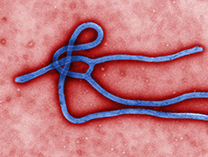ASC information portal on the Ebola outbreak in Africa
 The ASC has launched an information portal on the 2014 outbreak of Ebola (EVD, Ebola Virus Disease) in Africa. On the portal, you will find information from international health organizations like the World Health Organization and Doctors without Borders, government institutions of several (African) countries, news feeds and maps of the outbreak. The Information Portal will be updated regularly: http://countryportal.ascleiden.nl/2014-ebola-outbreak
The ASC has launched an information portal on the 2014 outbreak of Ebola (EVD, Ebola Virus Disease) in Africa. On the portal, you will find information from international health organizations like the World Health Organization and Doctors without Borders, government institutions of several (African) countries, news feeds and maps of the outbreak. The Information Portal will be updated regularly: http://countryportal.ascleiden.nl/2014-ebola-outbreak
These are some of the frequently asked questions on Ebola virus disease as answered by the World Health Organization:
What is Ebola virus disease?
Ebola virus disease (formerly known as Ebola haemorrhagic fever) is a severe, often fatal illness, with a death rate of up to 90%. The illness affects humans and nonhuman primates (monkeys, gorillas, and chimpanzees). Ebola first appeared in 1976 in two simultaneous outbreaks, one in a village near the Ebola River in the Democratic Republic of Congo, and the other in a remote area of Sudan. The origin of the virus is unknown but fruit bats (Pteropodidae) are considered the likely host of the Ebola virus, based on available evidence.
How do people become infected with the virus?
In the current outbreak in West Africa, the majority of cases in humans have occurred as a result of human-to-human transmission. Infection occurs from direct contact through broken skin or mucous membranes with the blood, or other bodily fluids or secretions (stool, urine, saliva, semen) of infected people. Infection can also occur if broken skin or mucous membranes of a healthy person come into contact with environments that have become contaminated with an Ebola patient’s infectious fluids such as soiled clothing, bed linen, or used needles.
(http://www.who.int/csr/disease/ebola/faq-ebola/en/)
These are some of the Frequently Asked Questions as answered by the National Institute for Public Health and the Environment in the Netherlands:
Are travel restrictions imposed?
The Ministry of Foreign Affairs has adjusted its travel advice for the countries Guinea, Liberia, Nigeria, and Sierra Leone for security reasons. For the latest news on travel advice of the Ministry of Foreign Affairs check their website www.rijksoverheid.nl/onderwerpen/reisadviezen
How do Schiphol airport and airline companies deal with a potentially infected passenger?
National and international agreements (IATA guidelines, International Health Regulations) have been made to identify people with infectious diseases in time to catch the plane and at Schiphol. Captains of aircrafts notify Schiphol when passengers with symptoms consistent with infectious diseases are due to arrive at Schiphol. An assessment will be made about the care of the patient in consultation with Schiphol Airport, GGD Kennemerland and RIVM. The possibility of transmission to other co-passengers and crew on board the aircraft will be assessed by health care providers on arrival. These operational procedures are trained regularly at Schiphol.
How is Ebola controlled should it enter the Netherlands?
Should anyone who is contaminated with the Ebola virus enter the Netherlands, a slight risk of further spreading of the disease is presented. A patient is contagious only if he/she has symptoms of the disease, which will be serious enough to require medical treatment. In the Netherlands, it is common to contact a doctor, who is obliged to report any suspicion of an Ebola contamination (or similar virus) to the Community Health Service. RIVM and the Community Health Service map all of a patient’s contacts, whose health is monitored for three weeks. As soon as they show any symptoms, they are immediately nursed in isolation, which is an effective way to control spreading. This has shown good results in the Netherlands with a patient with the Marburg virus in 2008. The Marburg virus is closely related to the Ebola virus.
What should a person do if he or she get sick after travelling to one of the infected countries?
In case of exposure to the Ebola virus it may take 2-21 days before visible symptoms occur. If a person gets flu-like symptoms within that time, please call the general practitioner of your residence and mention your recent travel.
(http://www.rivm.nl/en/Topics/E/Ebola/Frequently_asked_questions_about_Ebola)
Passengers arriving at Schiphol Airport receive a letter from the Public Health Service (GGD Kennemerland) stating that any person that has been in contact with a confirmed Ebola patient should contact the public health service of his residence: www.ggd.nl
List of institutions
Netherlands Ministry of Foreign Affairs: www.rijksoverheid.nl/onderwerpen/reisadviezen
RIVM (the National Institute for Public Health and the Environment): http://www.rivm.nl/en/Topics/E/Ebola
Netherlands ‘National Coordinating Centre for Travellers’ Advice’ (in Dutch): http://www.lcr.nl/Nieuws
Schiphol Airport currently has no information about Ebola on its website.
Brussels Airport: http://www.brusselsairport.be/nl/passngr/lugagge_travelinfo/travel_advice/ebola/
European Centre for Disease Prevention and Control: http://www.ecdc.europa.eu/en/healthtopics/ebola_marburg_fevers/factsheet_general_public/Pages/factsheet-general-public.aspx
Centers for Disease Control and Prevention (USA), communication material: http://www.cdc.gov/vhf/ebola/resources/index.html and information on signs and symptoms: http://www.cdc.gov/vhf/ebola/index.html

